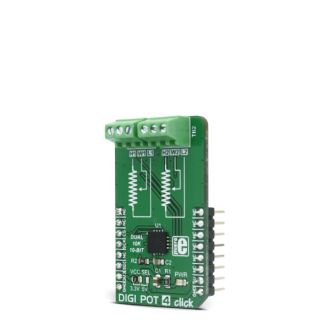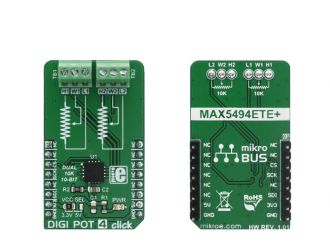
We strongly encourage users to use Package manager for sharing their code on Libstock website, because it boosts your efficiency and leaves the end user with no room for error. [more info]

Rating:
Author: MIKROE
Last Updated: 2018-03-13
Package Version: 1.0.0.0
mikroSDK Library: 1.0.0.0
Category: Digital potentiometer
Downloaded: 6948 times
Not followed.
License: MIT license
DIGI POT 4 click is a digitally controlled dual potentiometer, with the resistance of 10 kΩ. It has a 10 bit resolution which allows for a very smooth linear wiper positioning through 1024 steps.
Do you want to subscribe in order to receive notifications regarding "DIGI POT 4 click" changes.
Do you want to unsubscribe in order to stop receiving notifications regarding "DIGI POT 4 click" changes.
Do you want to report abuse regarding "DIGI POT 4 click".


Library description
The library carries two functions which are sufficient to have complete control over DIGI POT 4 click.
Key functions:
void digipot4_writeReg(uint8_t Reg, uint16_t value);- Write data to wiper register
void digipot4_copyReg(uint8_t Reg);- Copy data to NV memory
Example description
The application is composed of three sections :
void applicationTask()
{
digipot4_writeReg(_DIGIPOT4_WIPER_REG_1, 0);
digipot4_writeReg(_DIGIPOT4_WIPER_REG_2, 0);
Delay_1sec();
digipot4_writeReg(_DIGIPOT4_WIPER_REG_1, 512);
digipot4_writeReg(_DIGIPOT4_WIPER_REG_2, 512);
Delay_1sec();
digipot4_writeReg(_DIGIPOT4_WIPER_REG_1, 1023);
digipot4_writeReg(_DIGIPOT4_WIPER_REG_2, 1023);
Delay_1sec();
}
Additional notes and information
Depending on the development board you are using, you may need USB UART click, USB UART 2 clickor RS232 click to connect to your PC, for development systems with no UART to USB interface available on the board. The terminal available in all MikroElektronika compilers, or any other terminal application of your choice, can be used to read the message.